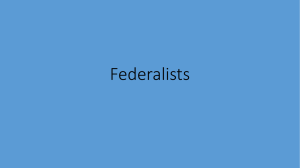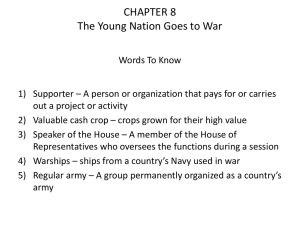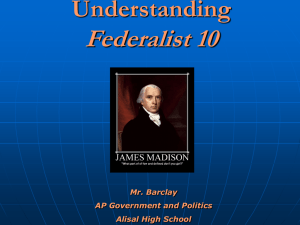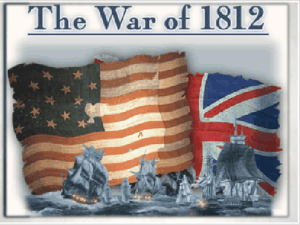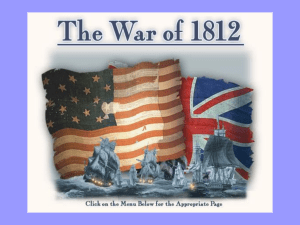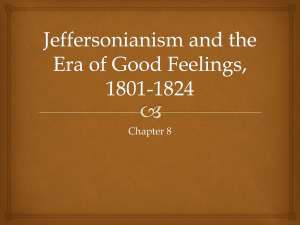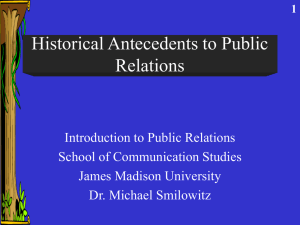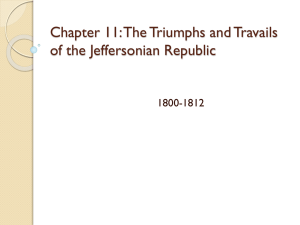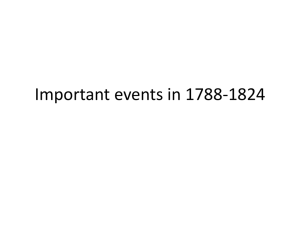FEDERALIST #10
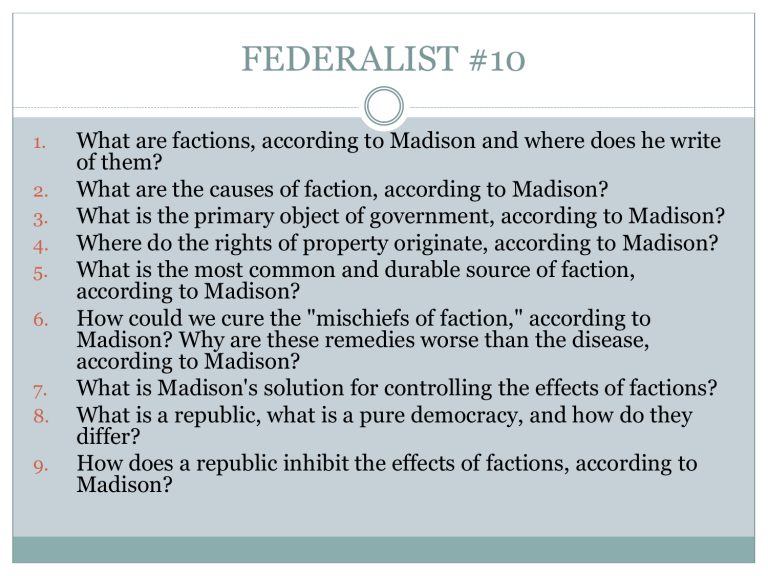
FEDERALIST #10
1.
2.
3.
4.
5.
6.
7.
8.
9.
What are factions, according to Madison and where does he write of them?
What are the causes of faction, according to Madison?
What is the primary object of government, according to Madison?
Where do the rights of property originate, according to Madison?
What is the most common and durable source of faction, according to Madison?
How could we cure the "mischiefs of faction," according to
Madison? Why are these remedies worse than the disease, according to Madison?
What is Madison's solution for controlling the effects of factions?
What is a republic, what is a pure democracy, and how do they differ?
How does a republic inhibit the effects of factions, according to
Madison?
FEDERALIST # 51
1.
2.
3.
4.
5.
6.
7.
8.
9.
10.
What are the three branches of government?
Which branch did Madison think would be the weakest?
Which methods does Madison suggest to check the powers of government?
How is the separation of powers between the three branches assured?
Give two examples of the "checks and balances" in the U.S. constitutional system.
Which branch appears as an exception to the separation of powers norm?
Why is this exception not dangerous?
What is federalism?
What are the two great advantages of federalism, according to Madison?
What is the "end" (supreme goal) of government, according to Madison?
What is Madison's view of human nature and how does it affect his prescriptions for the republic?
1. What are factions, according to Madison and where does he write of them?
In federalist #10 he explains that factions are “a number of citizens, whether amounting to a majority or minority of the whole, who are united and actuated by some common impulse of passion, or of interest, adverse to the rights of other citizens, or to the permanent and aggregate interests of the community.
2. What are the causes of faction, according to Madison?
Liberty and the differences of opinion
3. What is the primary object of government, according to Madison?
The protection of the diversity of faculties of men (including the rights of property)
4. Where do the rights of property originate, according to Madison?
In the faculties of men
5. What is the most common and durable source of faction, according to Madison?
The various and unequal distribution of property
6. How could we cure the "mischiefs of faction," according to Madison? Why are these remedies worse than the disease, according to Madison?
The cures would be to 1) destroy the liberty that is essential to its existence or 2) give to every citizen the same opinions, the same passions and interests
7. What is Madison's solution for controlling the effects of factions ?
1) the principle of majority rule 2) creating large republics that can “refine and enlarge” the views of the public
8. What is a republic, what is a pure democracy, and how do they differ?
Democracy- a society consisting of a small number of citizens , who assemble and administer government in person (can admit no cure for faction)
Republic- a government in which the scheme of representation takes place, opens a different prospect and promises a cure for which we are seeking.
9.How does a republic inhibit the effects of factions, according to Madison?
It refines and enlarges the public views by passing them through a medium of a chosen body of citizens, also in a republic the reps will be chosen by a larger # of citizens (more difficult for an unworthy candidates to practice)
FEDERALIST # 51
1. What are the three branches of government?
Executive, legislative and judicial
2. Which branch did Madison think would be the weakest?
The executive “the weight of the legislative authority requires that it should be thus divided, the weakness of the executive might require, on the other hand, that it should be fortified.”
3. Which methods does Madison suggest to check the powers of government?
By dividing government into branches and dividing state and federal government (Federalism)
4. How is the separation of powers between the three branches assured?
By giving each branch the means and motive to check and balance the others
5. Give two examples of the "checks and balances" in the U.S. constitutional system.
6. Which branch appears as an exception to the separation of powers norm? Why is this exception not dangerous?
The judiciary…chosen by the other -the need for special qualifications and permanent tenure
7. What is federalism?
Power divided between two distinct governments
8. What are the two great advantages of federalism, according to Madison ?
1) creating a will in the community independent of the majority- of the society itself 2) comprehending so many separate descriptions of citizens as will render an unjust combination of the majority of the whole very improbable.
9. What is the "end" (supreme goal) of government, according to Madison?
justice
10. What is Madison's view of human nature and how does it affect his prescriptions for the republic?
Men are not angels…at their best they are capable of reason and self-discipline but at their worst corrupt.
Anti Federalist “Address and Reasons of Dissent….”
The convention was to revise the Articles not create an entirely new govt. Weaknesses were agreed upon such as lack of power to tax, power to regulate commerce etc…
They didn’t feel the delegates were chosen fairly
They didn’t like the secrecy of the convention
They thought people were being alarmist and that the constitution was created in a rush and for convenience.
They believe people were pressured into supporting it by threats of tarring and feathering detractors.
They wanted to include Amendments but were denied
The precursor to the Bill of Rights is listed
When these Amendments were put forth they claimed to be treated with insults, personal abuse and not even treated with decency
The 3 main reasons for their dissent were 1) that such a large land cannot be governed on the principles of freedom other than by confederation united in foreign concerns only. 2) the federal powers will annihilate and absorb the powers of the states- under an iron-handed despotism. 3) the construction of the constitution was not calculated to obtain the principles of liberty and happiness of the people.
According to the new constitution the liberty and happiness of the whole country would be in the hands of 25 or 26 men- an inadequate and unsafe a reputation!
Those elected wouldn’t represent the common man but would have men of the most elevated ranks chosen.
The elected are also an unsafe representation as their terms are too long.
They are also weary of the President and the possibility of bribing the Senate.
They were afraid of a standing army to force citizens into going against their will.

